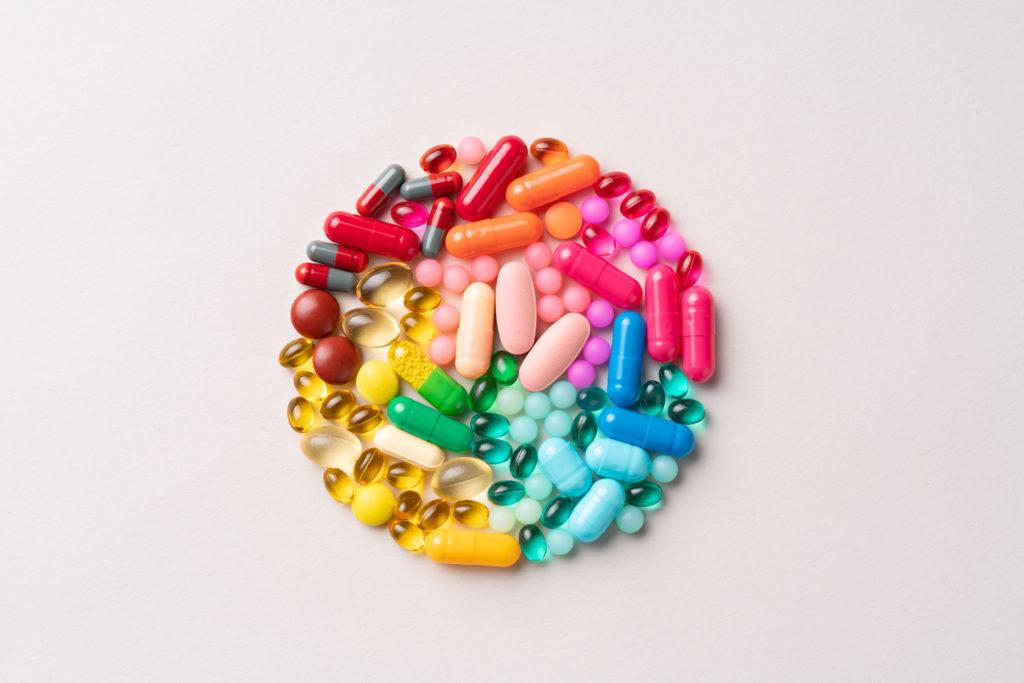

TikTok beauty influencer Kaycee Ogle is regularly contacted by brands who want her to promote their products. But one email she received in June was different, and made her curious.
“We’ve been impressed by your amazing content and would love to explore a collaboration with you!” the agency representative began.
WATCH: As weight loss drug demand soars, physician outlines effectiveness and potential downsides
The company wanted Ogle to promote one of their newer products: a small circular skin patch that claims to “support healthy weight management and appetite control.” Called “GLP-1 Patches,” the brand says the patch increases production of glucagon-like peptide-1, sometimes considered the satiety hormone, after two months of use.
Supplement manufacturers have capitalized on the explosive popularity of diabetes control and weight loss drugs such as Ozempic, Wegovy and Zepbound by flooding the market with their own pills, powders, drops and patches bearing “GLP-1” branding.
But experts say that while the efficacy of those supplements can vary, none are remotely as effective as the GLP-1 agonist medications semaglutide and tirzepatide, and the lack of regulatory oversight makes it hard for consumers to know exactly what they are purchasing and using.
The wide world of weight loss products ranges from legitimate medications, to compounded drugs offered by telehealth companies, to the gray market of online peptides, and supplements. That last category alone includes supplements claiming to replace GLP-1 agonists completely, “natural” versions of GLP-1 agonists that may work but be substantially less effective, and supplements intended to be taken alongside prescription medicine to “boost” GLP-1 production.
“The marketing seems to suggest that you could get with these natural products, these natural ingredients, the same effect that you can get with GLP-1 agonists, which is simply not the case. And in that way, they are being misleading to people,” said C. Michael White, professor of pharmacy practice at the University of Connecticut School of Pharmacy.
“Some of them don’t even tell you what ingredients are in it at all. And in those products, somebody may actually believe that they are going to get semaglutide or they are going to get tirzepatide.”
Ogle comes from a family of nurses, and prides herself on remaining honest, sticking to the facts and caring about the well-being of her viewers. She values their trust, which has helped her account and business thrive. So before she made any videos, she went looking for answers.
Capitalizing on the GLP-1 craze
GLP-1 is a hormone the body produces naturally that, among other roles, helps communicate satiety to the brain. GLP-1 agonists mimic the hormone and stimulate its receptor to trigger the same effect, which can aid weight loss by lowering appetite.
GLP-1 agonists have been around for decades, but in recent years, they’ve become almost culturally inescapable, thanks in particular to the success of Ozempic, Novo Nordisk’s injectable semaglutide that’s prescribed for patients with type 2 diabetes.
WATCH: New book by former FDA head explores the science behind GLP-1 weight loss drugs
Two of the major prescription weight loss medications, semaglutide sold by Novo Nordisk as Wegovy and tirzepatide sold by Eli Lilly as Zepbound, are typically injected once a week. But they’re also expensive, costing hundreds of dollars a month out of pocket, and often not covered by insurance.
That leaves a hole in the consumer market. Many people know about these drugs and how they affect weight loss, appetite control and “food noise.” But many can’t afford them, don’t like the idea of injecting drugs, or can’t tolerate the side effects, said Bryn Austin, professor of social and behavioral sciences at the Harvard T.H. Chan School of Public Health.
Enter supplements. Austin said that “from Day One,” supplement companies have tried to capitalize on the GLP-1 craze, putting the phrase in their product names. That’s deceptive, she said.
“Any consumer that sees that will think, ‘Oh, it must work like Ozempic,’” she said.

FILE PHOTO: The wide world of weight loss products ranges from legitimate medications, to compounded drugs offered by telehealth companies, to the gray market of online peptides, and supplements. On TikTok, users can buy drops, patches, pills and powders with GLP-1 branding. Photo by Getty Images
The supplements, however, do not perform nearly as well as GLP-1 agonists, White said. One ingredient often used in supplements is berberine, which researchers have found can aid in weight loss. But a meta-analysis by the European Society for Clinical Nutrition and Metabolism found that patients taking berberine lose a little over 4 pounds on average. Other ingredients can help with between 1 and 3 pounds, White added.
“So we’re not talking about the 20-something-pound weight loss that you actually get with a real GLP-1 agonist,” he said.
Nonetheless, those who promote the alternative products online often refer to them in the same context as the injectable medications, sometimes calling them “‘Zempic patches” or “natural” versions of the GLP-1 agonists. Some seem excited about the ingredients, the price or the lack of side effects. Some are also paid per sale.
The agency that contacted Ogle told her that she would be given “full creative support from start to finish,” including a script, ad support and free samples.
But Ogle wasn’t sure. She’d felt deceived in the past, promoting a nutritional powder she later learned was ineffective, and which she later disavowed. She replied to the email, asking whether their “GLP-1 Patch” product was approved by the Food and Drug Administration, and why the company advised her against using words like “Ozempic,” “weight loss,” “blood sugar” and “GLP-1” in promotional content. They never responded to her, Ogle said.
Ultimately, Ogle decided to make a TikTok video, but instead of promoting the patches, she warned prospective consumers.
“It’s just tricking people into wasting their money for something that’s not actually working,” she said in the video.
How safe and effective are GLP-1 supplements?
While pharmaceuticals released in the U.S. are legally required to undergo rigorous safety and efficacy testing and must be approved by the FDA, the same rules do not apply to supplements.
In 1994, Congress passed the Dietary Supplement Health and Education Act, which defined dietary supplements and created a regulatory framework that largely bypasses the FDA. Unlike the safety and efficacy testing mandated for drugs, supplement manufacturers are generally not required to provide safety evidence before releasing a product, with some exceptions.
Ultimately, “manufacturers and distributors have initial responsibility for ensuring that their dietary supplements meet the safety standards,” according to the FDA.
“The FDA cannot require rigorous pre-screening for safety and certainly not for effectiveness because by law, these supplements cannot claim to be treating or curing or preventing disease. And yet any consumer seeing the kind of marketing and claims on packages would likely infer that many of them do have those effects,” Austin said.
The bottom line, Austin said, is companies selling GLP-1 supplements don’t have to test their products in clinical trials or prove that they increase hormone production, reduce cravings, control appetite or quiet food noise.
“They are not required to provide any evidence before they go to a market,” she said.

FILE PHOTO: In 1994, Congress passed the Dietary Supplement Health and Education Act, which defined dietary supplements and created a regulatory framework that largely bypasses the FDA. Compared to other supplements, experts say products marketed for weight loss have a long history of being adulterated, sometimes including extreme levels of stimulants. Photo by Getty Images
Companies do have to tell the FDA that they have evidence, said Jensen Jose, regulatory counsel for the Center for Science in the Public Interest. But they don’t actually have to provide that evidence, he said.
In response to PBS News’ request for an interview with the FDA, the Department of Health and Human Services pointed to a page on the FDA’s website about using unapproved GLP-1 drugs for weight loss.
Compared to other supplements, experts say products marketed for weight loss have a long history of being adulterated. That can mean the products contain FDA-approved drugs that are illegal to use in supplements, extreme levels of stimulants and even experimental stimulants not approved for human use, all of which have shown up in supplements, Austin said.
WATCH: Cleanses? Supplements? How to tell fact from fiction with gut health advice
The Federal Trade Commission’s guidelines for health-related products require manufacturers to comply with a set of rules when using studies to market their products. This includes disclosing how the dosage and formulation of advertised products compares to studied products, whether ingredients in the advertised product are the same as what was used in the study and whether advertised products and studied products are administered in the same manner.
While some supplement websites cite studies, they don’t always meet these guidelines.
The company that reached out to Ogle, for example, references studies supporting the use of berberine, glutamine and chromium for weight loss, food intake and satiety. But the company’s patches are applied to the skin, while the studies for glutamine and chromium involved oral intake. The study cited for berberine was the meta-analysis, which encompassed many different studies where the administration methods are not always clear.
Many companies also don’t cite any studies where all the major ingredients found in its “GLP-1 Patch” are tested together, an important step in proving efficacy since certain ingredients can work against one another, said Caitlin Dow, nutrition scientist at the Center for Science in the Public Interest.
White said the science is not clear on how effectively a patch could administer these ingredients. In animal studies, transdermal patches have shown some promise in increasing bioavailability, or the body’s ability to access and use the ingredients compared to oral doses for ingredients like berberine and turmeric, he said.
“What we don’t have, at least not in the literature, is anybody that studied these products in humans in a transdermal patch formulation in order to be able to show that what they’re seeing in animals is actually being replicated in humans,” White said. “We would imagine that the results would likely be similar and that you would get more, but how much more, and what is a safe dose for you to be able to take?”
That kind of information is key, he added, because some ingredients could interfere with others users might be taking for problems like diabetes or heart disease.
“It may be more dangerous to be taking the products in this way than it would be to be taking them orally,” White said.

FILE PHOTO: Many companies also don’t cite any studies where all the major ingredients found in its “GLP-1 Patch” are tested together, an important step in proving efficacy since certain ingredients can work against one another, Dow said. Some ingredients could also interfere with others users might be taking for problems like diabetes or heart disease. Photo by Getty Images
In online reviews, some users of transdermal patches say the patches irritated their skin or left a rash.
Patches are a particularly thorny delivery method, because supplements by the FDA’s definition must be swallowed. Because patches are not supplements, Jose said, it’s not clear whether they would be classified as a cosmetic or drug (or possibly both).
The FTC can also step in if it believes companies have crossed an advertising line. In 2007, the FTC fined Transdermal Products International Marketing Corporation and its owner $180,000 and banned further sales, saying “advertising claims for their weight-loss patches were false and unsubstantiated.”
White said if someone is interested in taking any kind of supplement, they should look for products that have been reviewed, verified or certified by U.S. Pharmacopeia, NSF or ConsumerLab, which test supplements for adulterants or heavy metals.
TikTok ‘influencer economy’ raises concerns
TikTok users can scroll through video after video advertising weight loss supplements. In many of those videos, you can also tap a link at the bottom of the screen that will take you to the TikTok Shop, where purchases can be made directly in the app. Creators who are TikTok Shop affiliates, like Ogle, earn commission on products they promote and sell through the app.
Affiliates can see a range of details about a product, including the product’s net weight, quantity per pack, shelf life and whether it needs a dietary supplement disclaimer. Creators can also see how well the product is selling and how much commission they can make on each sale.
According to screenshots Ogle shared with PBS News, the product she was asked to promote was the top-selling item in its category on July 25, and creators could earn $2.97 for every sale of a 30-pack. Patches are sold for around $15, and more than 250,000 packs have been sold, according to publicly available numbers on TikTok’s shop. The patches have a four-star review average, with 9,100 reviews.
Patches aren’t the only kinds of “GLP-1” products available in the TikTok Shop — users can find drops, powders and pills — nor are GLP-1 branded supplements the only products claiming to help with weight loss. Yerba Mate in particular has found a niche on TikTok, where creators sometimes call it “nature’s Ozempic.”
WATCH: How ‘thinly veiled’ social media ads are influencing what we eat and drink
While supplements bearing GLP-1 branding are sold on websites beyond social media platforms, TikTok stands out by allowing viewers to shop directly from the promoted content without leaving the app. Some videos have tens of thousands of views.
Some, however, have only a handful of views, and that can reflect the struggle promoters sometimes face, Austin said.
“A lot of people on social media posting and trying to be influencers are just trying to cover the groceries, their rent, they have a patchwork of jobs that they’re piecing together to support their families,” she said.
“The way the influencer economy works is they need to follow certain kinds of rules that will get the algorithm to pick them up, to get more amplified, to get more engagement, and to attract the attention and approval of these companies. And for many of them, it’s just about trying to get by. And it’s pushing them toward posting in a way that is deceptive.”
Ogle too finds it difficult to blame affiliates and influencers, many of whom may believe the claims they’re advertising.
“A lot of people see [the] success that a lot of us TikTok Shop affiliates have had, and it has been life-changing. So the brands recognize that, and they can manipulate people who don’t really know how it works yet,” Ogle said. “” think a lot of people don’t have ill intention, but when they find out something didn’t work, it’s okay to just be human and say, ‘Hey, I wasn’t aware, now I am.’”
Health experts interviewed for this story worry about the effect these videos can have on vulnerable people, including children, people prone to eating disorders and people concerned about their weight.
Years ago, consumers wanting to buy weight loss supplements had to seek out ads in magazines or physically find one of these products, Austin said. Now, anyone who lingers on or engages with a weight loss video might find themselves caught in promoted content loops, thanks to social media algorithms.
“It would be like all day, every day, you had salespeople for these supplements knocking on your door and finding you,” she said.
“If somebody needs extra help losing weight, and that’s something they actually need, they should be talking to a doctor in a clinical setting. They shouldn’t be preyed upon on something like TikTok,” Ogle said.
“I love TikTok. I love the ability to be able to sell and to be able to buy on there,” Ogle said. But she believes products like the “GLP-1 Patch” are cause for concern: “I think it’s outright dangerous because there’s not enough information on them to know what effects those are having long term on people.”
If you’ve taken a GLP-1 branded supplement, or purchased a weight loss supplement on social media, and would like to share your experience, PBS News wants to hear from you. You can email Hannah at hgrabenstein@newshour.org.
We’re not going anywhere.
Stand up for truly independent, trusted news that you can count on!

















































